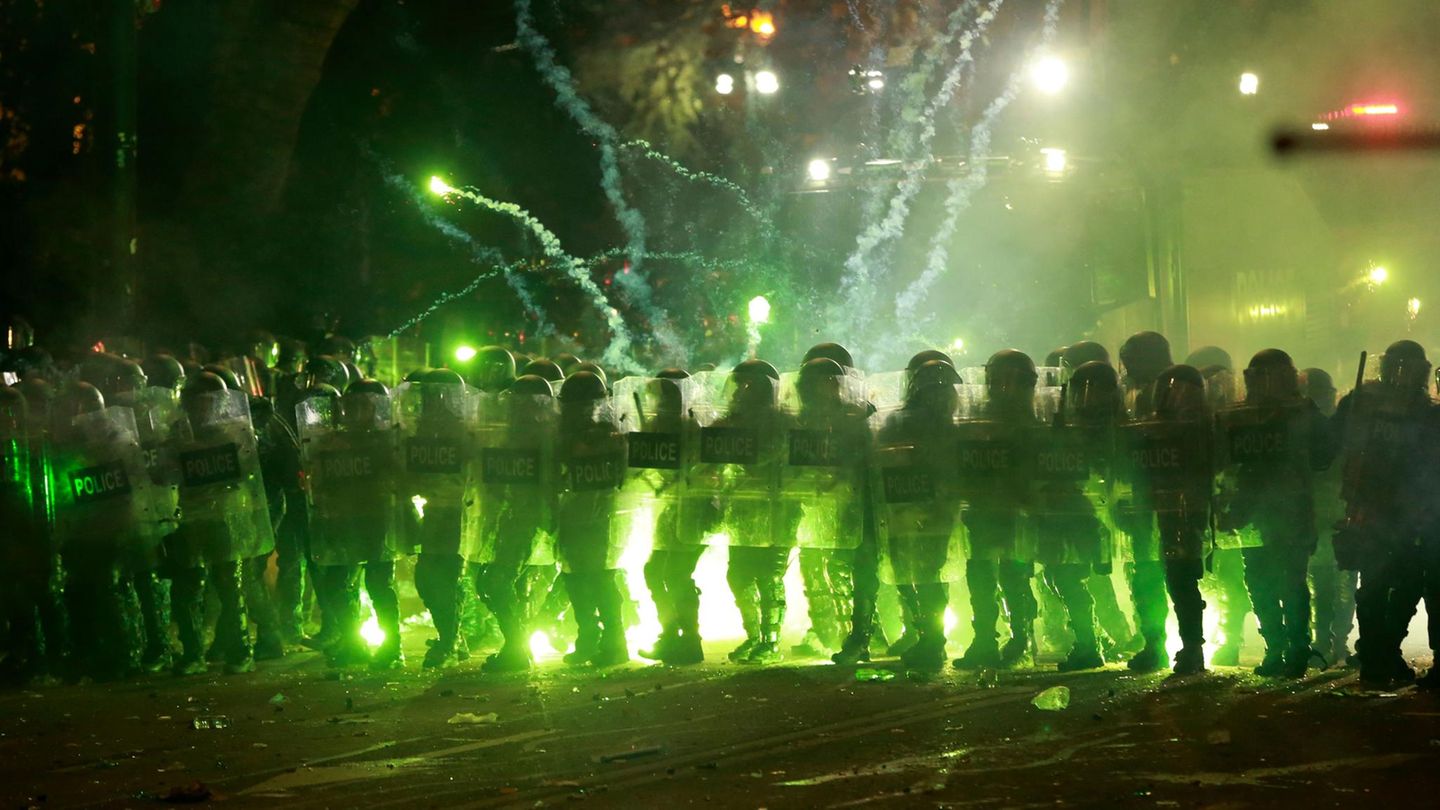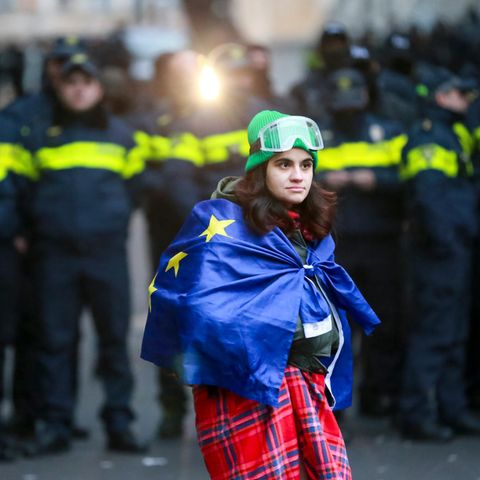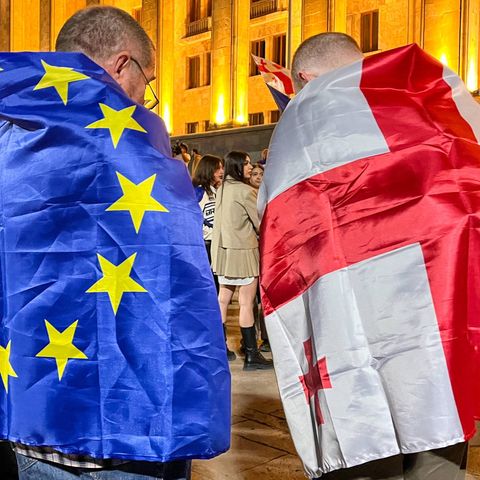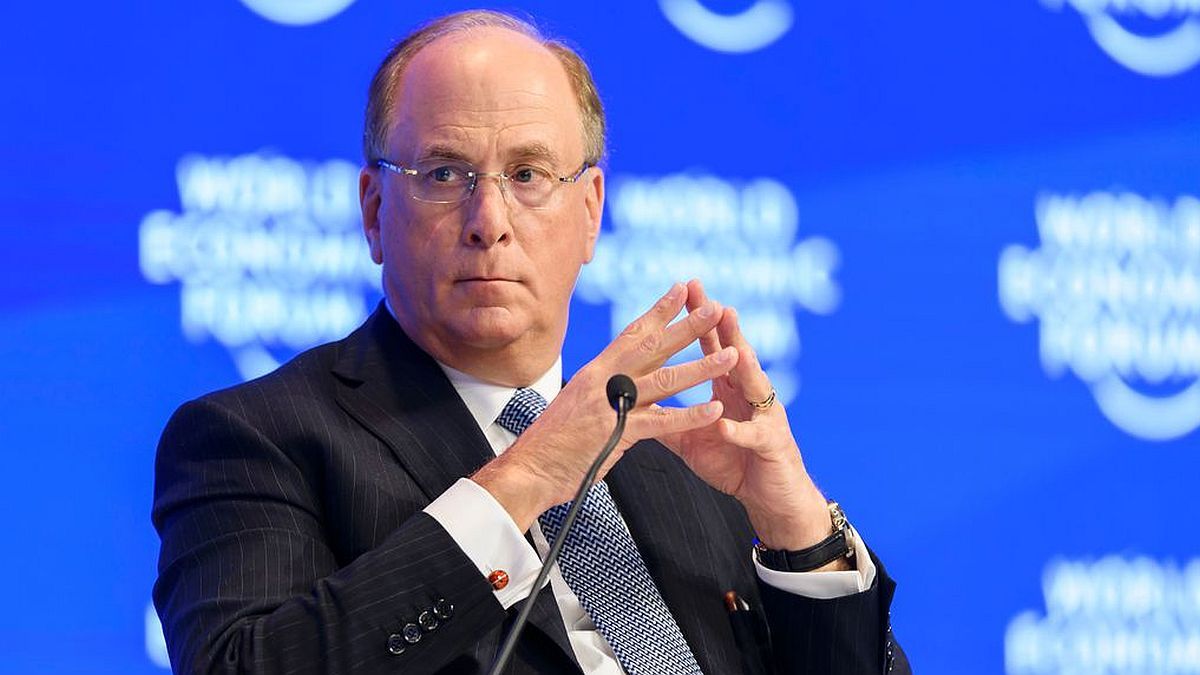Demonstrations every night
And there is always fear in Georgia: When will the situation escalate completely?
Copy the current link
Every night thousands of people demonstrate in Georgia against the government’s pro-Russian course. She hits back. Against the demonstrators – and now also against opposition leaders.
Early on this Tuesday evening, it was just seven o’clock, the Georgian police in the capital Tbilisi demonstrated what they wanted to do that night – the same thing as the night before and the one before that: show toughness. Where Rustaveli Avenue begins from Freedom Square towards Parliament, there are three black-painted water cannons with running engines, flashing lights blinding anyone who gets in their way.
A few meters away, the two students Gvantsa and Maria are also getting ready for the next night of protest. That night there will not be 100,000, but at least several tens of thousands, who will march in front of the parliament in Tbilisi.
Gvantsa has placed a white and red Georgian flag over his shoulders, Maria has tied a white cloth over her mouth – it’s supposed to help against the tear gas. “We are not afraid,” say the two 18-year-olds, who have just taken part in an election for the first time. “We are afraid that one day we will wake up in Russia!”
For almost a week, Georgia has been experiencing the largest protests since the “Rose Revolution” of 2003, not only in the capital but also in other cities across the country. They followed a parliamentary election at the end of October, highlighted by the Organization for Security and Co-operation (OSCE) observer mission. According to official figures, the ruling party “Georgian Dream”, which has ruled since 2012 and is controlled by billionaire Bidzina Ivanishvili, won 54 percent of the vote, the opposition alliance 37 percent.
80 percent of people in Georgia want to join the EU
However, protest against the elections remained weak. It was only when Prime Minister Irakli Kobachidze announced a week ago that Georgia would not hold any further negotiations about EU accession until 2028 and would no longer accept EU funds that people’s anger boiled over. Around 80 percent of the almost four million Georgians support EU accession for the small country in the South Caucasus, which borders on Russia in the north and Turkey in the west.
“Kobachidze has given us a gift,” says Giorgi Butikashvili. He stands in front of parliament while shrill whistles alternate with chants of “Georgia, Georgia” and the loud bang of New Year’s Eve rockets that the demonstrators fire in the direction of the police lines. The 37-year-old with a full beard and glasses could also be sitting in a Berlin hipster café. Butikashvili studied in Germany and worked for the Konrad Adenauer Foundation in Tbilisi until the spring. And actually he shouldn’t be standing in front of Parliament now, but sitting inside. Butikashvili won one of the 19 parliamentary seats from the Coalition for Change, but all 19 gave up their seats in protest against election fraud.
The young politician believes that now is the moment of decision: “We have to fight until the Robocops (that’s what the demonstrators call the police) are tired. And the point will come. We are much more than them.” Butikashvili also believes that the regime will eventually fall apart – the first ambassadors are actually resigning.
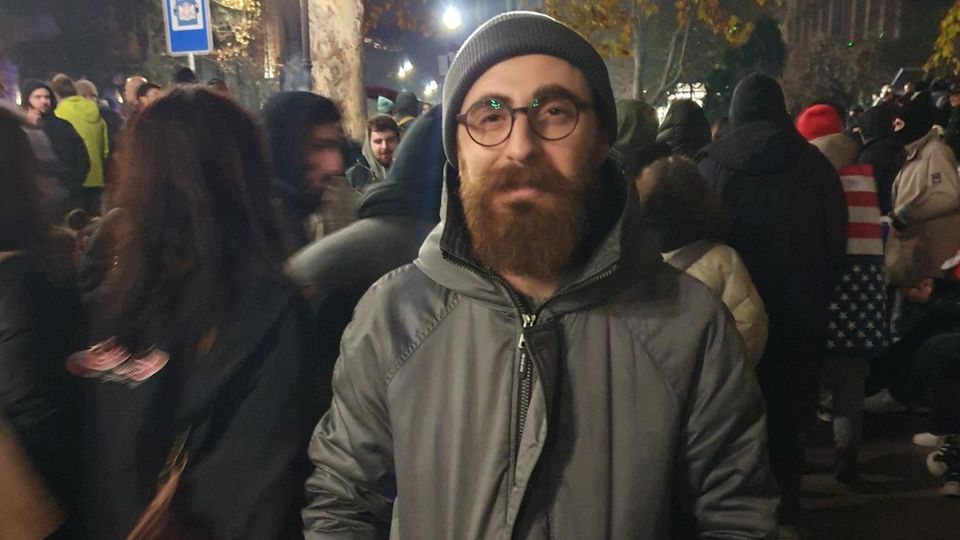
The West must now increase the pressure through personal sanctions against government members and Interior Ministry officials. “The regime wants to give the impression that the West only talks but doesn’t do anything,” warns Butikashvili. He is also convinced that none other than Russia is behind the government’s actions, and that Ivanishvili and his “Georgian Dream” were from the beginning a Russian project to pull Georgia back into Moscow’s orbit. In fact, Ivanishvili made his billions in Russia in the 1990s before returning to Georgia in 2003.
High up on the wall of Parliament, a projector casts the green letters “Russia, fuck your mother!” There is a widespread belief among the demonstrators that Ivanishvili’s goal is actually to “sell” the country, which was once part of the Tsarist Empire and the Soviet Union, back to Russia. But only among the demonstrators: These are mainly people between 20 and 40 who are oriented towards the West, study in Europe, and like to spend their weekends in Berlin on a low-cost airline.
For other Georgians, the aggressive propaganda of the “Georgian Dream”, according to which the West is trying to drag Georgia, like Ukraine, into a war with Russia, is starting to open a “second front”; The accomplices are the NGOs financed by the West and the opposition parties. Many Georgians have benefited from the rapprochement with Russia over the last few years – through Russian tourists and export opportunities. And since the start of the Ukrainian war, tens of thousands of Russians, particularly young ones, have moved to Georgia and brought capital into the country. On pro-government television channels, Georgians see the protests in a completely different light: there is no sign of massive police violence; instead, violent demonstrators are shown there, controlled by opposition members.
The protests lack central coordination
There is indeed violence from the demonstrators: New Year’s Eve rockets, bottles and other objects fly into the police ranks at Parliament. And like every evening, the police begin the evacuation around eleven o’clock in the evening: the water cannons advance, tear gas grenades fly in the direction of the demonstrators. They put on gas masks and fire rockets back, but try to keep their distance.
Because anyone who is caught by the police must expect a beating. Dozens of people, including journalists, have been admitted to hospitals in recent days, hundreds . But unlike in 2014 during the revolution in Kiev, Georgians have so far lacked organization: there is no fixed demonstrator camp, no organized groups, no visible protest leaders.
Pro-European President Salome Zurabishvili could be such a leader – she has so far stayed physically away from the protests but is calling on the entire country to join them. Meanwhile, the government is in the process of getting rid of Zurabishvili: the parliament, which is dominated by the “Georgian Dream,” is due to elect a new president in December: a former footballer who is known for his anti-Western comments.
The government is also trying to eliminate other opposition leaders: on Wednesday afternoon, the offices of several parties and NGOs were searched and opposition leader Nika Gvaramia was arrested. The regime is escalating – and Georgia is entering its seventh night of protests.
Source: Stern
I have been working in the news industry for over 6 years, first as a reporter and now as an editor. I have covered politics extensively, and my work has appeared in major newspapers and online news outlets around the world. In addition to my writing, I also contribute regularly to 24 Hours World.

